'Fear in the Night'

AKA:
Summary:

Labels: Fear in the night, hammer films, honeymoon of fear, joan collins, peter cushing
A MOVIE - RANDOMLY PICKED FROM OVER 90,000 TITLES - ONCE A WEEK

AKA:

Labels: Fear in the night, hammer films, honeymoon of fear, joan collins, peter cushing

 These cover sleeves for the movie Jailbreakin', and indeed the titles Jailbreakin' and Breakin' Out themselves (for a
These cover sleeves for the movie Jailbreakin', and indeed the titles Jailbreakin' and Breakin' Out themselves (for a  christian drama originally called The Ballad of Billy Blue) may be the most deceptive attempts to cash in on a famous name in the history of VHS B-movies. Although Erik Estrada famously appeared in another Christian action/Drama called The Cross and the Switchblade, a movie even I remember being shown at least three times in Sunday school, in The Ballad of Billy Blue, he appears in only three scenes, and never once, thankully, without his shirt on. You only get about five minutes of Estrada and about ninety minutes of Jason Ledger (??).
christian drama originally called The Ballad of Billy Blue) may be the most deceptive attempts to cash in on a famous name in the history of VHS B-movies. Although Erik Estrada famously appeared in another Christian action/Drama called The Cross and the Switchblade, a movie even I remember being shown at least three times in Sunday school, in The Ballad of Billy Blue, he appears in only three scenes, and never once, thankully, without his shirt on. You only get about five minutes of Estrada and about ninety minutes of Jason Ledger (??). The Ballad of Billy Blue (1972)
The Ballad of Billy Blue (1972) Summary:
Summary: Impressions:
Impressions: So there you go - the movie stunk.
So there you go - the movie stunk.

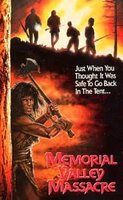 In the rich world of horror movies, there exists many sub-genres with suspense, slasher, zombie/undead perhaps being the three most popular. I feel, now, that with Memorial Valley Massacre, we can add yet another phylum: Ecological Horror.
In the rich world of horror movies, there exists many sub-genres with suspense, slasher, zombie/undead perhaps being the three most popular. I feel, now, that with Memorial Valley Massacre, we can add yet another phylum: Ecological Horror.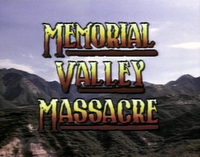 Summary:
Summary: vid immediately begins wooing an attractive single camper, we get to meet some of the other vacationers who each find their own way to pollute the campground and endanger its delicate balance of nature. We have sex-hungry bikers and teenagers who discard their beer cans and the fat kid who like to tear up the trails with his three-wheeler.
vid immediately begins wooing an attractive single camper, we get to meet some of the other vacationers who each find their own way to pollute the campground and endanger its delicate balance of nature. We have sex-hungry bikers and teenagers who discard their beer cans and the fat kid who like to tear up the trails with his three-wheeler. This is where the campground's resident cave-hermit and, I believe, the movie's true hero comes in. He's a guy who subsists on the fruits mother nature has to offer, wears animal skins but still makes friends with the mice and rats in his underground abode. He was perfectly happy living a life of solitude, fully secluded from modern civilization. Perfectly happy, that is, unti
This is where the campground's resident cave-hermit and, I believe, the movie's true hero comes in. He's a guy who subsists on the fruits mother nature has to offer, wears animal skins but still makes friends with the mice and rats in his underground abode. He was perfectly happy living a life of solitude, fully secluded from modern civilization. Perfectly happy, that is, unti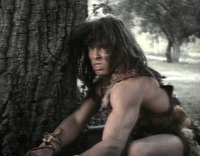 l modern civilization came knocking on his cave door! (That was my poor excuse for a tagline) This is where the said “massacre” begins. In true caveman fashion, he uses what primitive weapons he has at his disposal to eliminate those who have attempted to destroy his fields and streams and bring unwanted chaos to his peaceful existence. All this makes for some hilarious and rewarding action sequences, especially the demise of the annoying fat three-wheeler-riding mamma's boy. We eventually learn that the hermit is actually the long-lost teenage son of the park's chief superintendent.
l modern civilization came knocking on his cave door! (That was my poor excuse for a tagline) This is where the said “massacre” begins. In true caveman fashion, he uses what primitive weapons he has at his disposal to eliminate those who have attempted to destroy his fields and streams and bring unwanted chaos to his peaceful existence. All this makes for some hilarious and rewarding action sequences, especially the demise of the annoying fat three-wheeler-riding mamma's boy. We eventually learn that the hermit is actually the long-lost teenage son of the park's chief superintendent.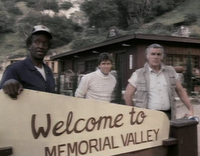
 Finally, a movie from this decade! But wait, it's a Patrick Swayze movie from this decade. Damn!
Finally, a movie from this decade! But wait, it's a Patrick Swayze movie from this decade. Damn! 
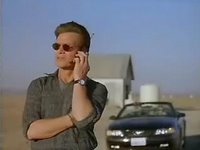 Summary:
Summary: e they split, she had gotten pregnant and had to give the baby up for adoption and she thinks they ought to give the kid a visit. The boy, Martin, now aged seventeen years and played by Joseph Gordon-Levitt (who also played "Tommy" on 3rd Rock From the Sun and that kid in Angels In The Outfield, and who I always confuse for that other kid who played "Russ" in National Lampoon's Christmas Vacation and Darlene's boyfriend on Roseanne; which is all the more confusing to me since Joseph Gordon-Levitt was ALSO on several episodes of Roseanne) now lives with his adoptive parents in Madison, Wisconsin.
e they split, she had gotten pregnant and had to give the baby up for adoption and she thinks they ought to give the kid a visit. The boy, Martin, now aged seventeen years and played by Joseph Gordon-Levitt (who also played "Tommy" on 3rd Rock From the Sun and that kid in Angels In The Outfield, and who I always confuse for that other kid who played "Russ" in National Lampoon's Christmas Vacation and Darlene's boyfriend on Roseanne; which is all the more confusing to me since Joseph Gordon-Levitt was ALSO on several episodes of Roseanne) now lives with his adoptive parents in Madison, Wisconsin. Well after about an hour of scenes of Ben talking on his cell phone to his angry wife (which seemed to eat up about 80% of the film stock) and Lulu making wild passes at a very stoic, unresponsive Ben in motel rooms and swimming pools, they finally get to their hotel in Madison. By this time we also now know that Ben and his wife had also had a child who died from Leukemia. Anyway, after checking in to the hotel, Ben encounters his wife who had flown out there to intercept them. It all culminates into a tense moment to say the least, especially with crazy-ass Lulu hanging on his arm wanting to know who the angry chick is. After everything settles down, they all agree to disagree long enough to go visit the biological son. However, once they arrive, the kid pretty much rejects his parents and calls Lulu "crazy." She leaves the dinner table and runs out of the house. Luckily, Ben knows right where to find her. You see, on the way to the kid's house, they passed a movie theater showing the classic film, The Hustler, a movie both Lulu and Ben know by heart since it was their favorite way back when. We see them both watching the movie on TV earlier in the story quoting all the lines; Ben at his home, and Lulu still in her psych home. When they get there,
Well after about an hour of scenes of Ben talking on his cell phone to his angry wife (which seemed to eat up about 80% of the film stock) and Lulu making wild passes at a very stoic, unresponsive Ben in motel rooms and swimming pools, they finally get to their hotel in Madison. By this time we also now know that Ben and his wife had also had a child who died from Leukemia. Anyway, after checking in to the hotel, Ben encounters his wife who had flown out there to intercept them. It all culminates into a tense moment to say the least, especially with crazy-ass Lulu hanging on his arm wanting to know who the angry chick is. After everything settles down, they all agree to disagree long enough to go visit the biological son. However, once they arrive, the kid pretty much rejects his parents and calls Lulu "crazy." She leaves the dinner table and runs out of the house. Luckily, Ben knows right where to find her. You see, on the way to the kid's house, they passed a movie theater showing the classic film, The Hustler, a movie both Lulu and Ben know by heart since it was their favorite way back when. We see them both watching the movie on TV earlier in the story quoting all the lines; Ben at his home, and Lulu still in her psych home. When they get there,  Martin, who already apologized to Ben, and wants to make things right with his biological mom, asks if he can go in there to talk to her alone. They both apologize to eachother and everyone is happy.
Martin, who already apologized to Ben, and wants to make things right with his biological mom, asks if he can go in there to talk to her alone. They both apologize to eachother and everyone is happy.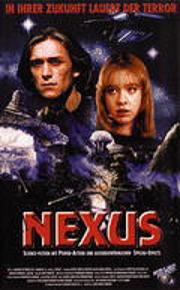
 In the Earth's future, the world had become very, very polluted. So polluted, in fact, that the Earth couldn't take it anymore and, one day, exploded! Right before the explosion, a select few sensed this would happen and were able to evacuate to a distant, dersert planet who offered solace in their barren equatorial regions.
In the Earth's future, the world had become very, very polluted. So polluted, in fact, that the Earth couldn't take it anymore and, one day, exploded! Right before the explosion, a select few sensed this would happen and were able to evacuate to a distant, dersert planet who offered solace in their barren equatorial regions. daughter eventually winds up captive on a spaceship, so on and so forth. Then there's this really effeminate guy (unfortunately, our hero) who's literally never seen a girl before, ever, and sits around his cave all day worshipping these three crystal knives. The mysterious daughter appears to him as if in a dream, gives him a kiss and his first ever glimpse of a girl. Having finally seen a girl, he decides he likes girls very much, grabs his three knives, ventures out of his cave and, enlisting the help of another really bad European actor, saves her. Just don't ask me how.
daughter eventually winds up captive on a spaceship, so on and so forth. Then there's this really effeminate guy (unfortunately, our hero) who's literally never seen a girl before, ever, and sits around his cave all day worshipping these three crystal knives. The mysterious daughter appears to him as if in a dream, gives him a kiss and his first ever glimpse of a girl. Having finally seen a girl, he decides he likes girls very much, grabs his three knives, ventures out of his cave and, enlisting the help of another really bad European actor, saves her. Just don't ask me how.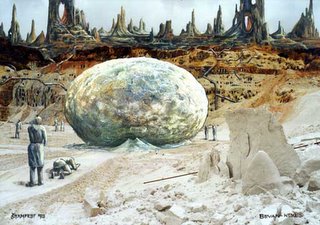 The main thing I liked about Nexus 2.431 was the way it made up for its lack of actual quality with really, really ugly costumes. No, just kidding, it made up for it with an abundance of shots of greasy men staring at things. No, no - okay, got you again. Really, for serious this time, it made up for it with ambition. Raw, oily, nicotine-stained European ambition. I always try to find at least one thing about these movies I like, and I guess that'll have to do for now. It was ambitious.
The main thing I liked about Nexus 2.431 was the way it made up for its lack of actual quality with really, really ugly costumes. No, just kidding, it made up for it with an abundance of shots of greasy men staring at things. No, no - okay, got you again. Really, for serious this time, it made up for it with ambition. Raw, oily, nicotine-stained European ambition. I always try to find at least one thing about these movies I like, and I guess that'll have to do for now. It was ambitious.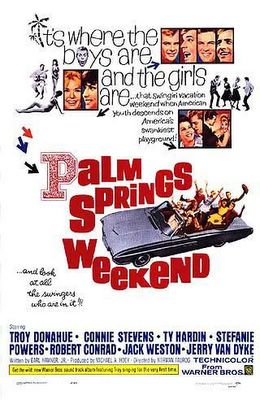


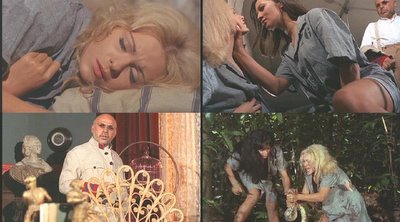
Impressions:
Icky. This movie had an air of ickiness all over it. That's not to say that in an icky, exploitative way, it wasn't well made, because it kinda' was, if you can ignore the fact that nearly every interior seems to have been lit with one solitary light. But even with all the nice, scenic Brazilian exteriors and the Spanish and Italian architecture it features, the movie still mainly consisted of scenes of blurry lesbian encounters, rape, catfights, face smacking, hair-pulling, camera zooming, catfights, blurry what-nots and rape. There wasn't a whole lot more to this one. In an attempt to make the dialog as irritating as possible, the screenwriter saw fit to have all the characters repeat the same lines over and over:
"On the other side of the island, there's a fishing village... with boats!"
"She has committed repeated insolence!"
"Zis eez a place of punishment for crimes against zee laws of society!"
Oh, and one more thing - the actress who played the bull-dyke warden was also the voice of the possessed Regan MacNeil in The Exorcist.
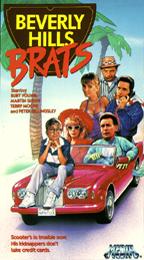 Beverly Hills Brats (1989)
Beverly Hills Brats (1989)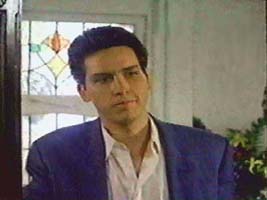

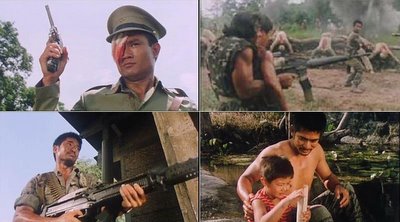 Summary:
Summary: